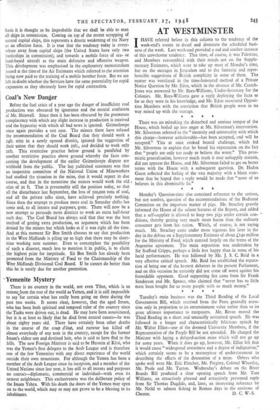AT WESTMINSTER
IHAVE referred before in this column to the tendency of the week-end's events to dwarf and dominate- the scheduled busi- ness of the week. Last week-end provided a sad and sombre instance of this unwelcome tendency. This time, of course, it was Palestine, and Members reassembled with their minds not on the Supple- mentary Estimates, which were to take up most of Monday's time, but on the outrages in Jerusalem and to the fantastic and repre- hensible suggestions of British complicity in some of them. The matter was ventilated in the time-honoured method of a Private Notice Question by Mr. Eden, which in the absence of Mr. Creech- Jones was answered by Mr. Rees-Williams, Under-Secretary for the Colonies. Mr. Rees-Williams gave a reply deploying the facts so far as they were in his knowledge, and Mr. Eden associated Opposi- tion Members with the conviction that British people were in no way mixed up with the outrage.
* * * *
There was no mistaking the disturbed and anxious temper of the House, which boiled up into anger at Mr. Silverman's intervention. Mr. Silverman referred to the "intensity and universality with which this charge—however unbelievable—has been accepted, 2nd will be accepted." This at once evoked heated challenge, which led Mr. Silverman to explain that he based his expectation on the fact that "people are only too ready to believe the worst." This pessi- mistic generalisation, however much truth it may unhappily contain, did not appease the House, and Mr. Silverman failed to get on better terms with the House with a subsequent question. Dr. Haden Guest reflected the feeling of the vast majority with a blunt state- ment that he hoped that a reply would be made that " none of us believes in this abominable lie."
* * -* * Monday's Question-time also contained reference to the serious, but not sombre, question of the recommendations of the Bodinnar Committee on the important matter of pigs. Mr. Strachey gravely informed the House of the salient features of the Report, and added that a self-supplier is allowed to keep two pigs under certain con- ditions,
thereby getting very much more bacon than the ordinary consumer gets from his ration. Which, of course, is not saying much. Mr. Strachey came under more vigorous fire later in the day in the debate on a Supplementary Estimate of about £140 million for the Ministry of Food, which centred largely on the terms of the Argentine agreement. The main exposition was undertaken by Sir Stafford Cripps, perhaps a little less happy than in some of his lucid performances. He was followed by Mr. J. S. C. Reid in a very effective critical speech. Mr. Reid has established the reputa- tion of being one of the keenest debaters in the present Parliament, and on this occasion he certainly did not come off worst against his formidable opponent. Good supporting fire came from Sir Frank Sanderson and Mr. Spence, who claimed that " never has so little meat been bought for so many people with so much money."
* * * * Tuesday's main business was the Third Reading of the Local Government Bill, which received from the Press generally atten- tion only in proportion to its entertainment value rather than to its great ultimate importance to ratepayers. Mr. Bevan moved the Third Reading in a short and unusually restrained speech. He was followed in a longer and characteristically felicitous speech by Mr. Walter Elliot—one of the doomed University Members, if the Representation of the People Bill be not amended. He charged the Minister with laying a delayed-action mine which will not go up for some years. When it does go up, however, Mr. Elliot felt that it would cause "widespread uneasiness and a degree of indignation," which certainly seems to be a masterpiece of understatement in describing the effects of the detonation of a mine. Others who spoke well were Mr. Eric Fletcher, Mr. Pargiter, Colonel Wheatley, Mr. Poole and Mr. Turton. Wednesday's debate on the River Boards Bill produced a clear opening speech from Mr. Tom Williams, an attractively phrased and attractively presented reply from Sir Thomas Dugdale, and, later, an interesting reference by Mr. Neild to salmon fishing in Roman days in the environs of


































 Previous page
Previous page